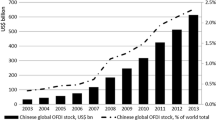Abstract
While China is fast becoming an important outward direct investor, its companies are showing an increasing interest to locate in Europe and the European Union (EU). It has been suggested that this can partly be explained by the more lenient attitude of the European countries compared to the US, where some acquisitions were abandoned when they ran into political opposition based on security concerns. Yet, also in Europe, the media follow rather closely each new Chinese entry, and certain politicians have started to criticise the take-over of technology-oriented companies, especially by Chinese state-owned firms. Against the background of a very open foreign direct investment (FDI) policy as measured by OECD FDI Restrictiveness Index for the EU and the individual countries, an overview is given of the pre- and post-establishment obstacles to direct foreign investment. Also, the EU policy measures that directly or indirectly deal with incoming direct investment are discussed. Within the context of the EU competition policy and the merger regulation, the EU Commission has cleared five cases of take-over by Chinese state-owned enterprises. Although the Lisbon Treaty authorises the EU Commission to take charge of investment policy as part of the EU commercial policy, it will take time to realise this. If the announced negotiations about an investment treaty between China and the EU could work out the necessary balance, it would be an important step in achieving more reciprocity between their respective investment regimes.


Similar content being viewed by others
Notes
This overlooks the fact that Chinese privately owned companies are also venturing into Europe, and many small- and medium-sized entrepreneurial firms have located in EU countries, especially in East and Central Europe, but increasingly also in other European countries (Zhang, Yang, & Van Den Bulcke, 2011).
Only during the first month of 2012, several mega-M&As involving Chinese companies were concluded or announced. Examples are the take-over of German Putzmeister by Sany Construction Machinery (€360 million); the acquisition of a 21 % stake in Energias de Portugal by China Three Gorges Project Corporation (€800 million); the participation of 25 % in the equity capital of the Portuguese firm Redes Energeticas Nacionais by China State Grid (€387 million); the acquisition of 48 % of the shares in the regional French airline Aigle Azur by Hainan AIrlines (US$40 million) and the 10 % stake in Heathrow Airport Holdings Ltd by China's sovereign wealth fund, China Investment Corporation (CIC) (€415 Million).
In 2011, when Chinese tycoon Huang Nubo wanted to buy a 300-km2 farm in the north-eastern part of Iceland to build a golf course, hotel and resort, the deal was rejected by Iceland's government as foreign ownership of its land is prohibited. However, according to the managing director, Thordur Hilmarsson, of ‘Invest in Iceland Agency’, the parliament of Iceland, which by the way is the oldest in the world, is considering amending its laws to become more flexible towards IFDI.
According to notifications made by countries adhering to the OECD National Treatment Instrument, all 39 countries covered in published compilations of discriminatory investment measures report that they discriminate against foreign investors in one or more critical infrastructure sectors. Transport is the most targeted sector—all 39 countries report having discriminatory measures in this sector. In many cases, these discriminatory investment policies are minor (e.g. limited to ‘cabotage’ and investments in vessels flying the national flag). Twenty-nine have discriminatory policies in post and telecommunications; 28 in energy; 25 in radio and television; 22 in agriculture/food and in defence; 18 in drinking water and treatment systems; and 17 in banking and finance (OECD, 2008).
The EU has been preparing for an investment treaty with China since the summer of 2010, when a ‘Joint EU-China Investment Task Force’ was set up, followed by a Steering Group at the end of that year. Between May and July 2011, the EU Commission held a public consultation on ‘The future investment relationship between the EU and China’ and in September 2012, a joint press communiqué at the 5th EU-China Summit reconfirmed the commitment of both parties to launch the negotiations about such an agreement. In May 2013, the Commission asked for a mandate from the member states to open negotiations on an investment agreement with China.
References
Alvarez JE, Sauvant KP, Ahmed KG, Vizcaino GP (2011) The evolving international investment regime: expectations, realities, options. Oxford University Press, Oxford
AmCham China (2012) 2012 China business climate survey report. Beijing
Apoteker T, Barthelemy S, Lunvin S (2013) EU China FDI in the 21st century: Who is ready for a “win-win” strategy: TAC and European Parliament
Berger A (2008) China's new bilateral investment treaty programme: substance, rational and implications for international investment law making. In: 2008 biennial conference “The politics of international economic law: the next four years”. American Society of International Law International Economic Law Interest Group (ASIL IELIG), Washington
Blomkvist K (2011) The impact of a common EU FDI approach on individual member states and overall EU competitiveness. Annual SNEE conference, Mölle, Sweden
Clemente D (2013) Cyber security and global interdependence: What is critical? Chatham House (The Royal Institute of International Affairs), London
Clifford Chance (2011) Major developments and policy issues in European Union competition law: the year in review, GCR Conference, 15-16 November 2011, Brussels
De Beule F, Van Den Bulcke D (2010) Changing policy regimes in outward foreign direct investment: from control to promotion. In: Sauvant K, McAllister G, Maschek W (eds) Foreign direct investment from emerging markets. The challenges ahead. Palgrave Macmillan, New York, pp 277–305
De Beule F, Van Den Bulcke D (2012) The impact of the global economic crisis on foreign direct investment. The case of China. In: Florence E, Defraigne P (eds) Towards a new development paradigm in the twenty-first century. Routledge, London, pp 49–65
De Beule F, Van Den Bulcke D, Zhang H (2011) Chinese outward direct investment in Europe and Belgium: characteristics and policy issues. In: Brennan L (ed) Emergence of southern multinationals and their impact on Europe. Palgrave MacMillan, New York, pp 195–225
Desai K, Mohan M (2011) Fear of the Chinese or business as usual at the European Commission? EU Merger Regulation and the assessment of transactions involving Chinese state-owned enterprises. Competition Policy International-Antitrust Chronicle 8(2)
European Commission (2005) Green paper on a European programme for critical infrastructure protection
European Commission. 2010a. Establishing transitional arrangements for bilateral investment agreements between member states and third countries: European Commission.
European Commission. 2010b. Study on the industrial implications in Europe of blurring of dividing lines between security and defence, final report.
European Commission. 2010c. Towards a comprehensive European international investment policy: European Commission.
European Parliament. 2010. The EU approach to international investment policy after the Lisbon Treaty: Directorate-General for External Policies.
European Parliament. 2013. The development of a European defence technological and industrial base (EDTIB): European Parliament's Subcommittee on Security and Defence, Directorate-General for External Policies of The Union-Policy Department.
European Union Chamber of Commerce in China (2013a) Business confidence survey 2013. European Union Chamber of Commerce in China, Beijing
European Union Chamber of Commerce in China (2013b) Chinese outbound investment in the European Union. European Union Chamber of Commerce in China, Beijing
Filippov S (2012) European investment promotion agencies vis-àvis multinational companies from emerging economies. Comparative analysis of BRIC investor targeting. UNU-MERIT Working Paper Series, United Nations University
Fountoukakos, K., & Puech-Baron, C. 2012. The EU Merger Regulation and transactions involving states or state-owned enterprises: applying rules designed for the EU to the People's Republic of China. Competition Law Journal (1-2012): 44–54.
GAO (2008) Foreign investment: laws and policies regulating foreign investment in 10 countries. Government Accountability Office, Washington DC
Kalinova, B., Palerm, A., & Thomsen, S. 2010. OECD's FDI Restrictiveness Index: 2010 update. OECD Working Papers on International Investment, OECD Investment Division (No. 2010/3).
Koyama T, Golub S (2006) OECD's FDI Regulatory Restrictiveness Index: revision and extension to more economies. Working Paper on International Investment, Paris: OECD
MOFCOM (2012) 2011 statistical bulletin of Chinas outward foreign direct investment. Ministry of Commerce of People’s Republic of China, National Bureau of Statistics of People’s Republic of China and Sate Administration of Foreign Exchange, Beijing
Moran, T. H. (2009) Three Threats: An Analytical Framework for the CFIUS Process (Policy Analysis in International Economics 89). The Peterson Institute for International Economics
OECD (2008) Protection of critical infrastructure and the role of investment policies relating to national security. The Organization for Economic Cooperation and Development, Paris
Rosen, D. H., & Hanemann, T. 2011. An American open door? Maximizing the benefits of Chinese foreign direct investment: center on U.S.-China relations of Asia society and Kissinger Institute on China and the United States.
Sauvant, K. P., & Chen, H. 2012. A China-US bilateral investment treaty: a template for a multilateral framework for investment? Columbia FDI Perspectives,(No 85, December).
Schäfer, D. 2012. Chinese banks flee London's tough rules. The Financial Times
Servan-Schreiber J-J (1967) Le Défi Américain. Editions Denoel, Paris
Shan W, Zhang S (2010) The Treaty of Lisbon: half way toward a common investment policy. Eur J Int Law 21(4):1049–1073
Shan W, Zhang S (2013) The potential EU-China BIT: issues and implications. In: Bungenberg M, Reinisch A, Tietje C (eds) EU and investment agreements: open questions and remaining challenges. Hart and Nomos, pp 87–120
Stemsrud, O. 2011. "China Inc." under Merger Regulation review: the Commission's approach to acquisitions by Chinese public undertakings. E.C.L.R(10): 481-487.
Thomas, D., Pickard, J., & Blitz, J. 2012. Cameron reaffirms support for Huawei, Financial Times.
Van Den Bulcke D, Zhang H, Esteves M (2002) European Union direct investment in china: characteristics, challenges and perspectives. Routledge, London
Véron, N. 2011. Europe needs consistency in welcoming foreign investors: Peterson Institute for International Economics.
Zhang AH (2012) Single entity theory: an antitrust time-bomb for Chinese state-owned enterprises? J Compet Law Econ 8(4):805–830
Author information
Authors and Affiliations
Corresponding author
Additional information
Daniel Van Den Bulcke is deceased.
Rights and permissions
About this article
Cite this article
Zhang, H., Van Den Bulcke, D. China’s direct investment in the European Union: a new regulatory challenge?. Asia Eur J 12, 159–177 (2014). https://doi.org/10.1007/s10308-014-0383-9
Published:
Issue Date:
DOI: https://doi.org/10.1007/s10308-014-0383-9




